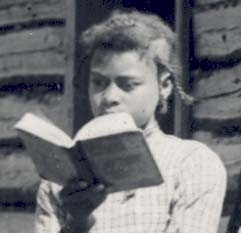I grew up reading black women authors. Their stories not only moved me, but felt like home. Their published words offered me healing, strength, truth, courage, laughter and hope. I really don’t know who I’d be if I’d not read Carry Go Bring Come repeatedly in infant school, Hacker in Juniors, or The Friends at the peak of my angsty teenage years. Big Girls Don’t Cry was re-read regularly between GCSEs and university – ie as I was getting ready to go out into the world. The stories they told have shaped the woman I am. As much as I revelled in the adventures of the St Clare’s girls, and Tracy Beaker, Kitty Killen, and many other non-black female characters illuminated and accompanied me loyally through various dramas of my young life, they could never speak to the totality of my second generation immigrant, inner city reality like an Edith Jackson.
And my mum and other black adults in my life foresaw that. A keen reader (a school report once noted I was caught reading ‘at inappropriate times’ aka in Maths), I read and loved all sorts of books; my mum complained for years about my obsession with Sweet Valley Twins. However the adults in my life were careful to ensure I always had what Chimamanda Ngozi Adichie later termed ‘a balance of stories’.[i] Through my love of reading, my extended family nurtured my sense of self as a black woman to-be: I became accustomed to black girls being the centre of a great adventure as often as anybody else because of the books I read. How could I not grow into a confident, ambitious young black woman when I was familiar with so many universes in which black girls like me shined brightly?
Thus when two black friends my age asked me if I could name 5 black women authors of fiction, I genuinely wondered if this was a trick question. ‘Francophone ones?’ I paused ‘Hmm…Condé, Schwartz-Bart, Lacascade…’ With more time I’d have added Danticat, Jessica Oublié. No, they clarified, writing in any language. They had recently realised they could not name 5 black women authors between them. That there were black people who didn’t know there was a whole world of black women’s writing was a revelation: Black women authors part-raised me. They are the wise, understanding, encouraging aunties I’ve never met. They’ve been looking after my wellbeing, nourishing my dreams, sharing their escapades and experiences and inspiring my own adventures for as long as I can remember.
The question came in a context: I’d recalled a former student, a black woman. At the end of the course her feedback was ‘black people, we have done things. We’re not always in the background, the sidekick or sideshow.’ She was a Caribbean-born and based heritage professional, at least 15 years my senior and her unexpected response both made me want to weep – she had lived her whole life not knowing black people had ‘done things’?! She learned that in my lil class?? – and determined to teach black history. She’d probably never read many books by black people about black people, my friends had surmised.
At their request, and perhaps subconsciously for that student, I produced a list of my most treasured fiction by black women authors[ii], smiling at all the memories. Not all the fiction by black women in the world, nor all the books I have read by black women. The 20 odd novels by black women I have loved more than others that came to mind in the 12 hours after the request. Your favourite reads might not appear: it’s my list. It doesn’t include beloved non-fiction, nor recent books on my to-read list because I’ve heard great things. Just my favourite novels, brilliant fiction, centring black people by black women writers.
Enjoy!
- Half of a Yellow Sun by Chimamanda Ngozi Adichie
- House of the Spirits by Isabel Allende* (YA: Zorro or City of the Beasts, though not 100% unproblematic)
- Memoirs of a Born Free by Malaika Wa Azania**
- Une Si Longue Lettre (English: So Long a Letter) by Mariama Bâ
- Noughts and Crosses by Malorie Blackman (YA) (kids: Hacker)[iii]
- Big Girls Don’t Cry by Connie Briscoe
- Kindred by Octavia Butler
- Moi, Tituba, Sorcière (English: I, Tituba) by Maryse Condé (awesome companion to The Crucible by Arthur Miller)
- Half-Blood Blues by Esi Edugyan
- Phillip Hall Likes Me I Reckon Maybe by Bette Greene* (YA)
- The Friends by Rosa Guy (YA) (kids: Paris, Pee Wee and Big Dog)
- Their Eyes Were Watching God by Zora Neale Hurston
- Annie John by Jamaica Kincaid (YA)
- Passing by Nella Larsen
- Small Island by Andrea Levy
- To The Black Women We All Knew by Kholofelo Maenetsha
- Your Blues Ain’t Like Mine by Bebe Moore Campbell
- The Bluest Eye by Toni Morrison
- Carry Go Bring Come by Vyanne Samuels (kids)
- The Secret Lives of Baba Segi’s Wives by Lola Shoneyin
- Rainbows of the Gutter by Rukshana Smith* (YA)
- On Beauty by Zadie Smith
- Roll of Thunder, Hear My Cry by Mildred D. Taylor (YA)
- Homegoing by Yaa Gyasi
- The New Moon’s Arms by Nalo Hopkinson
Please note, the vast majority of these authors have published more than one book I’ve loved, but I decided 1 spot per author.
If you read the list, and your instinctive response is ‘You would love X novel by Y black woman author!’ please comment and suggest it! I might have read it, it might get bumped up my to-read list, but I might have never heard of it and you then gift me with my newest favourite book. For which I’ll always be grateful.
[i] In her 2009 Ted Talk ‘The Danger of a Single Story’
[ii] As I looked up some of my most cherished reads, I realised some authors weren’t black women. As I’d lived blissfully ignorant of/clearly forgotten this fact until now (except Isabel Allende) I left the books on anyway and asterisked the authors because I clearly felt that auntie love through their work.
[iii] Where authors or books are for children or young adults, I’ve added a kids (up to 10) or YA (10-16) title or bracket.
**Okay, not technically a novel, but her memoirs recount three generations of women living through and after apartheid, and I was so engrossed it felt like a novel.












